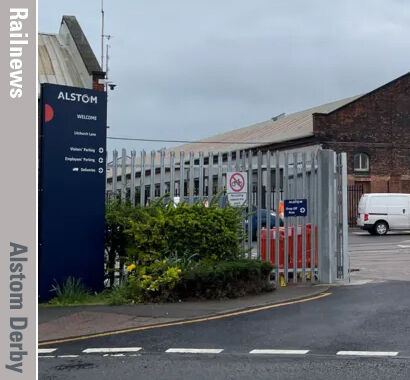Updated 12.53
The Alstom works in Derby is in line for an order of up to 90 cars for the Elizabeth Line, according to reports. Such an order for more Aventra vehicles would not be a new contract, because an option for enlarging the TfL fleet already exists. Meanwhile, the RMT is calling for an urgent summit to discuss the threat to the Derby works, where closure would mean the loss of thousands of jobs.
Some reports today claim that the deal has already been done, while others say only that Alstom is in ‘intense discussions’ with the Department for Transport and Transport for London, and that no contracts have yet been signed but could be concluded next month.
Last night transport secretary Mark Harper used social media site X to report ‘a good, constructive meeting with Alstom Group CEO Henri Poupart-Lafarge on the future of train manufacturing in the UK’. while Alstom posted that it was ‘now in a period of intense discussions with the UK Government and Transport for London about a potential train order for the Elizabeth Line, given the levels of passenger demand. This could help secure the future of our Derby Litchurch Lane site.’
Alstom had already taken the first steps toward shedding 1300 jobs at Litchchurch Lane alone, and as the uncertainty continued, the RMT called for an ‘urgent summit’ of unions, the rail industry and the government to thrash out a plan to save Alstom in Derby, including the option of nationalisation.
RMT general secretary Mick Lynch said it was ‘tragic’ that passengers and the climate were in desperate need of modern and reliable trains and skilled workers and capacity were ready to deliver that, but the government and rail industry had not been able to match up the demand and supply of new trains.
He continued: ‘The root cause of this failure is the privatisation and break up of a once unified public rail industry into multiple companies, with competing, profit motivated short-term interests which has prevented a lack of coherent planning for the delivery of rolling new trains and infrastructure.
‘This is not new: it is a problem that has plagued the railway supply chain for many years.
‘The consequences of the UK losing its last remaining train manufacturing facility will not only be devastating for jobs and the local community it would be disastrous for passengers as the government will have to rely on imported stock which could be more expensive to build and maintain.’
Railway Industry Association chief executive Darren Caplan said: ‘Suppliers will hope current discussions between Ministers and all train manufacturers achieve a positive outcome. The future of rail businesses of all sizes, factories and jobs depends on the decisions taken by the Government now.
‘Immediate solutions are clearly needed to mitigate short-term risks, and sustain jobs and UK capability. But the Government urgently needs to bring forward invitations to tender for new procurements in the medium term and listen to industry proposals which have called for a level playing field for manufacturers to bid for the £3.6 billion of orders.’


